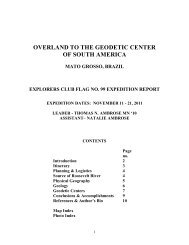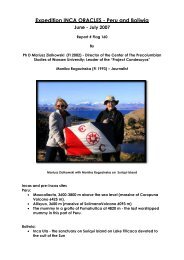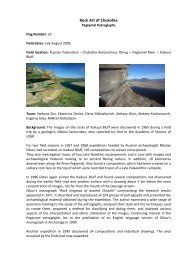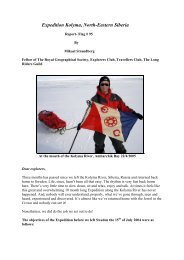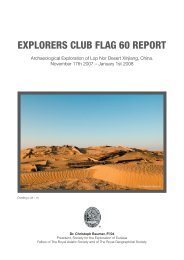the explorers journal the climate change issue - The Explorers Club
the explorers journal the climate change issue - The Explorers Club
the explorers journal the climate change issue - The Explorers Club
You also want an ePaper? Increase the reach of your titles
YUMPU automatically turns print PDFs into web optimized ePapers that Google loves.
exploring <strong>climate</strong> <strong>change</strong> No. 1<br />
Venturing<br />
Of <strong>the</strong><br />
to <strong>the</strong> Ends<br />
Earth<br />
exploring our planet’s polar regions:<br />
chroniclers of <strong>the</strong> past and portents of <strong>the</strong> future<br />
by Paul Andrew Mayewski<br />
It has been 50 years since <strong>the</strong> first International<br />
Geophysical Year (IGY) invited <strong>the</strong> best minds in<br />
science from around <strong>the</strong> globe to join forces in tackling<br />
<strong>issue</strong>s such as understanding Earth’s oceans<br />
and atmosphere and <strong>the</strong> delicate relationship<br />
between <strong>the</strong>m. Since <strong>the</strong>n, many advances have<br />
been made in this area, among <strong>the</strong> most important,<br />
<strong>the</strong> understanding of <strong>the</strong> role of greenhouse<br />
gases such as carbon dioxide (CO 2<br />
) in determining<br />
Earth’s <strong>climate</strong>. In more recent years, a realization<br />
that gases such as CO 2<br />
are on <strong>the</strong> rise has led to an<br />
interest in determining and documenting past levels<br />
of greenhouse gases. Ga<strong>the</strong>ring such information,<br />
however, entails journeying literally to <strong>the</strong> ends of<br />
<strong>the</strong> Earth. For <strong>the</strong>re, locked in thousands of meters<br />
of ice, are records of our planet’s changing chemical<br />
and physical <strong>climate</strong> that stretch back nearly a<br />
million years.<br />
When I began my <strong>climate</strong> research nearly 40<br />
years ago, few in <strong>the</strong> scientific community regarded<br />
Earth’s polar regions as important to <strong>the</strong><br />
vast majority of civilization. At that time, Antarctica<br />
was viewed as not only a frozen continent but also<br />
a continent frozen in time. This view seemed to<br />
be amply supported by <strong>the</strong> ice-free valleys of <strong>the</strong><br />
Victoria Land Coast in East Antarctica, where<br />
rocks had been exposed to millions of years of<br />
wind erosion, creating timeless landscapes. <strong>The</strong><br />
vast interior of <strong>the</strong> polar plateau also appeared to<br />
be <strong>change</strong>less to <strong>the</strong> few limited expeditions that<br />
passed but once across <strong>the</strong> surface.<br />
Increased access to <strong>the</strong> most remote portions<br />
of Antarctica and <strong>the</strong> Arctic—afforded by aircraft<br />
and ship in recent years—complemented by our<br />
ability to mount lighter, faster, and more efficient<br />
expeditions and establish well-equipped field stations,<br />
has resulted in <strong>the</strong> acquisition of an abundance<br />
of information that is dramatically changing<br />
our understanding of <strong>the</strong> critical role polar regions<br />
play in Earth’s complex ecosystem.<br />
Remarkably, <strong>the</strong>se regions have now emerged<br />
as “first responders” for monitoring current <strong>climate</strong><br />
because <strong>the</strong>y are so sensitive to warming;<br />
<strong>the</strong> vast ice-trapped environmental libraries <strong>the</strong>y<br />
host chronicle hundreds of thousands of years of<br />
Earth’s <strong>climate</strong> history. <strong>The</strong> ice cores we extract<br />
from <strong>the</strong> polar regions contain highly robust records<br />
of past <strong>climate</strong>. <strong>The</strong>se ancient records not<br />
only allow us to better understand <strong>the</strong> long-term<br />
cyclical <strong>change</strong>s in <strong>climate</strong> caused by natural phenomena<br />
such as <strong>the</strong> 26,000-year precession of<br />
<strong>the</strong> equinoxes, which is in part responsible for <strong>the</strong><br />
ice ages; volcanic eruptions; and solar activity, but<br />
to separate <strong>the</strong>se factors from variations in <strong>climate</strong><br />
22 <strong>the</strong> <strong>explorers</strong> <strong>journal</strong>




